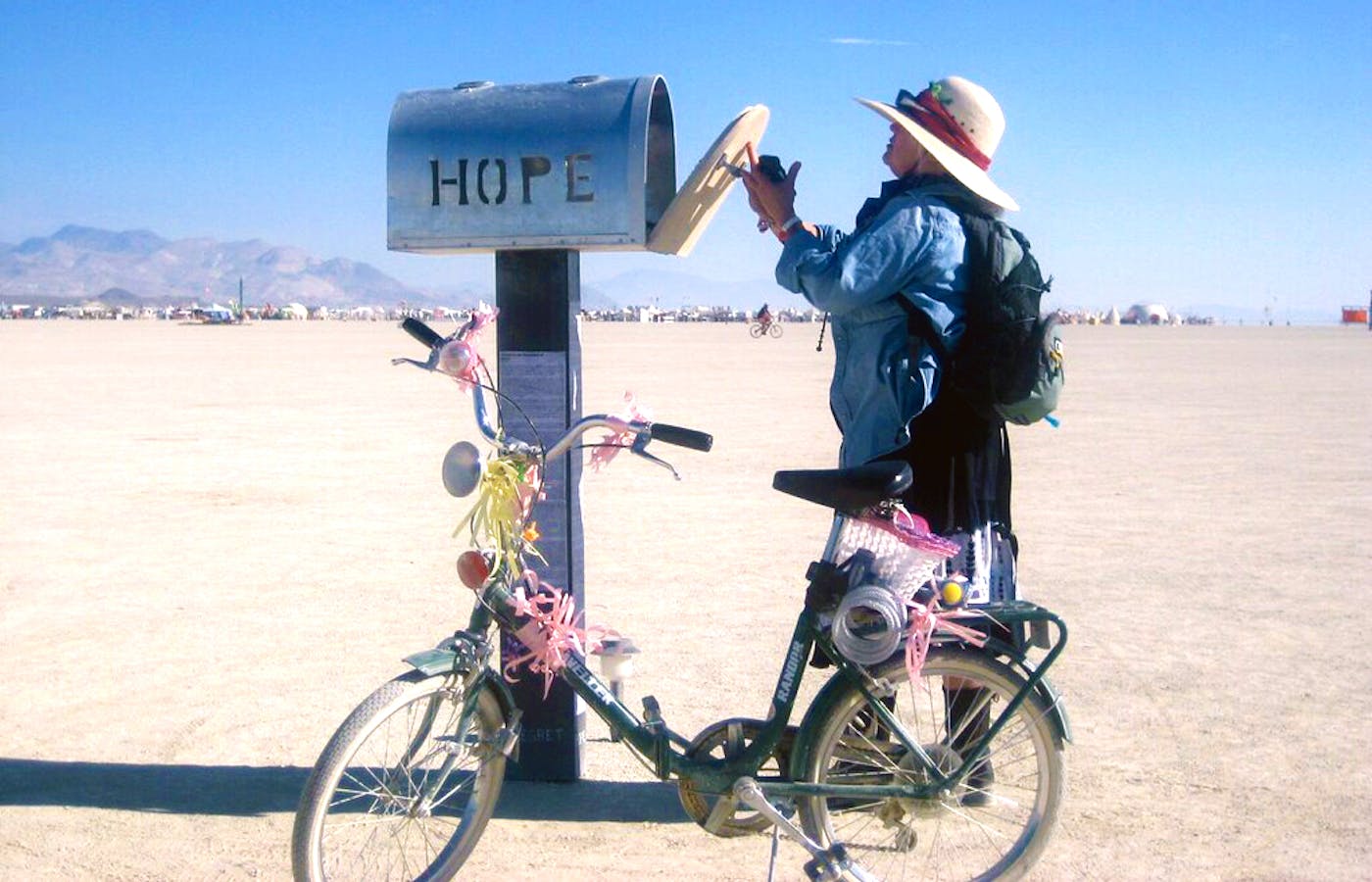Nevada’s Annual Experiment in a Temporary, (Nearly) Car-Free City
By: Dave Snyder, senior director for infrastructure

Burning Man, the weeklong desert event focused on community, art, and self-reliance, shows a path toward gender equity in bicycling.
In the most bicycle-friendly cities in Europe, women ride their bikes for transportation in nearly equal proportions to men. In the Netherlands, women bike more than men. Unfortunately, that’s not true in the United States, where women account for just 28% of bike commuters according to the 2019 American Community Survey. Are American women different, with less tolerance for risk than their European counterparts? Or are American streets just that much more dangerous?
Earlier this month, the temporary city in the Black Rock desert of northern Nevada, built by participants of the annual Burning Man festival, provided an ideal experiment to show what could happen in an American city with a bicycle-centric transportation system. Over the course of a week, about 70,000 people coalesce in roughly three square miles, a population density similar to central Minneapolis. For years, its residents have found that bicycling is the best way to get around the city.
According to traffic counts at this year’s festival, people on bikes made up 86% of traffic. (For those curious, about one-fifth of those were e-bikes or other electric devices like skateboards). Although there were plenty of cars (almost one per minute), they traveled slowly, barely over the 5 mph speed limit. Nobody was afraid of getting hit by a car, even though there was not a bike lane or a traffic control device in the entire city.
With so many bikes and safe, but chaotic, interactions among bicyclists and between bicyclists and cars, the streets of this “American” city looked much like the streets of Amsterdam — albeit with a lot more sand and mud.
And regarding gender? American women are no different than Dutch women, at least when it comes to transportation choice. In Black Rock City, ridership among women was roughly equal to or even greater than ridership among men. While attendees identifying as female only accounted for 42% of the population, they accounted for 45% of the bicycle riders. It was a revelation for many women. Qualitative surveys conducted by the Burning Man census team discovered that women mentioned “bicycles” about four times more than men in open-ended questions about what they remember as special from Burning Man.
Another amazing impact of slow car traffic is that people hardly noticed them. Cars, including small electric “cars” such as golf carts, were essential to the functioning of the city. They included golf carts for people with disabilities, heavy machinery for servicing camps and latrines, and government pickup trucks and squad cars. When asked to estimate how many cars were sharing the roads with them as they biked, participants drastically underestimated the number of cars. Most were surprised that as many as 42 cars per hour traveled on the roads with them.
Black Rock City shows the massive potential of centering bicycling in a city’s transportation system:
- It provides unprecedented mobility for women, who will bike as much as men if the streets are safe.
- Nearly everyone (17 out of 20, in this case) will choose bicycling if it’s safe and the fastest way to get around town.
- Making the streets safe means protecting people from cars.
- Limiting the number of cars and reducing speeds allows for an efficient transportation system without the need for lanes, signs, or signals.
Traffic Count Results

Black Rock City shows that Americans of all genders are happy to rely on bicycling if it’s safe. Yes, the temporary city in the desert has the advantage of being built from scratch, while permanent cities have centuries of habits and infrastructure to contend with. However, it’s built completely from scratch in a matter of weeks. It should not take us decades to rebuild our permanent cities to make them safe for bicycling.
These lessons from Black Rock City show the importance of the Great Bike Infrastructure Project, PeopleForBikes’ new program transforming communities across the United States with infrastructure that enables people of all ages and abilities to comfortably ride a bike for everyday trips. We need to permanently rebuild American cities to create gender equity, access for everyone, mobility convenience, and joy. Burning Man participants build a city of 70,000 in a few weeks. Let’s not take too long to rebuild American cities.
Related Topics:
